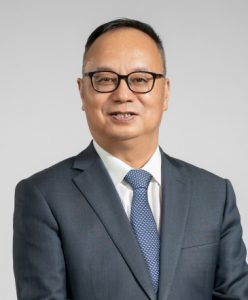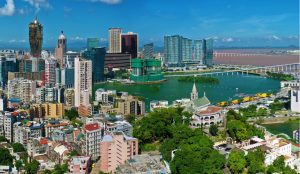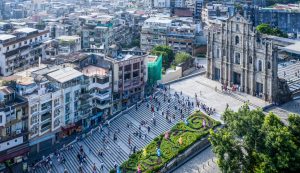Sustainable development is a shared goal of humanity. In 2015, the United Nations launched the 2030 Agenda for Sustainable Development, which established 17 Sustainable Development Goals (SDGs) across three key dimensions—environmental, social, and economic—aiming to build a greener and more balanced future for all. Higher education institutions, as hubs of knowledge and innovation, play a vital role in advancing this global agenda. The University of Macau (UM) contributes to these global efforts through distinctive ideas and practical initiatives.
Distinctive Research Vision and Directions
UM has developed a clear strategy and taken concrete steps to advance sustainable development. Between 2020 and 2024, the university published 6,030 research papers related to SDGs, representing about 30% of its total research output. Among these articles, research related to SDG7 (Affordable and Clean Energy), SDG4 (Quality Education), and SDG3 (Good Health and Wellbeing) accounted for the highest number of publications, highlighting UM’s strong research activity in these areas.
According to Rector Yonghua Song, UM’s key approach to advancing SDGs is to integrate sustainable development concepts into both teaching and research. Guided by its positioning as a university ‘rooted in Macao, taking part in the development of the Greater Bay Area, integrating into the nation, and going global’, UM leverages innovative technologies to address societal needs.
UM’s sustainable development research layout spans all three key SDG dimensions (see Table). In the environmental dimension, research focuses on developing technologies to address global challenges, such as achieving carbon neutrality, improving wastewater treatment efficiency, marine pollution control, and aquatic biodiversity conservation. In the social dimension, research addresses issues directly related to quality of life and social wellbeing, including new-energy battery technologies, Chinese medicine-based drug development, youth education, and mental health. In the economic dimension, research achievements include advances in industry growth theory, world heritage tourism, income distribution and international trade, and mobile edge computing technology, supporting Macao’s economic diversification and regional industry transformation.
Core Advantages in SDG Research
This research layout is underpinned by UM’s core strengths in SDG-related research, which Rector Song describes as a synergistic approach built on four pillars: Macao’s institutional and geographic advantages, the university’s international platforms, commitment to interdisciplinary integration, and alignment with regional development priorities.
Rector Song explains: ‘First, UM benefits from the institutional and geographic advantages of Macao as a special administrative region, which operates under the “one country, two systems” policy. Macao’s unique context provides UM with a research environment that bridges Chinese and Western systems, enabling the university to serve as a connector between China and Portuguese‑speaking countries, as well as ASEAN members, supporting the national strategy for international science and technology cooperation. Second, UM’s international faculty and global platforms help build an international innovation network, enhancing the global impact of research. Third, the university’s commitment to interdisciplinary integration cultivates comprehensive and forward‑looking innovation capabilities. Fourth, UM aligns research closely with the development priorities of Macao, the Guangdong–Macao In‑Depth Cooperation Zone in Hengqin, and the Guangdong–Hong Kong–Macao Greater Bay Area.’ Building on these advantages, UM’s research across the environmental, social, and economic dimensions is highly focused and applied, enabling the rapid translation of research results into practical solutions that address real‑world challenges.
Drawing a Blueprint for a Sustainable Future
Looking ahead, Rector Song shares UM’s plan to establish a Sustainable Development Office on its campus in the Cooperation Zone in Hengqin, which is expected to begin operations in 2028. This new office will coordinate the university’s sustainable development initiatives and monitor related performance indicators. He explains, ‘We will build a research ecosystem driven by the synergy between our two campuses, creating a comprehensive structure that integrates fundamental research, technology transfer, and industry incubation. The university will strengthen research in medicine and healthcare, microelectronics and the Internet of Things, and energy carbon neutrality. In addition, we will develop strategic emerging disciplines including medicine and life sciences, microelectronics and chip technology, creative design and digital culture, green finance and fintech, and new engineering disciplines.’
To expand its international cooperation network, UM will continue cultivating diverse partnerships and deepening collaboration with universities in English‑speaking, Portuguese‑speaking, and neighbouring countries. These initiatives include developing joint research platforms, co‑training research talent, and broadening both the scope and depth of international collaboration. Rector Song also notes that in 2026, UM will host the 35th Annual Meeting of the Association of Portuguese Speaking Universities and participate in the Annual General Meeting of the Association of East Asian Research Universities. The university is committed to fostering academic exchange as a bridge for global knowledge sharing and technological collaboration in sustainable development.
Moving forward, UM will use its campus in the Cooperation Zone in Hengqin as a springboard to further leverage Macao’s institutional and geographic advantages along with the university’s international platforms. The university aims to build an international research hub that contributes to high‑level opening‑up of China’s education and science sectors and offers distinctive ‘Macao solutions’ to global sustainable development challenges.
Text: Gigi Fan
Photo: Editorial board
English Translation: Bess Che
Source: UMagazine Issue 32


UM Rector Prof Yonghua Song

Table: UM’s major research areas across the three key dimensions of SDGs

UM drives decarbonisation through research in environmental sustainability

UM aligns its research in the social dimension closely with societal needs

UM leverages its research strengths in the economic dimension to support regional industry diversification

